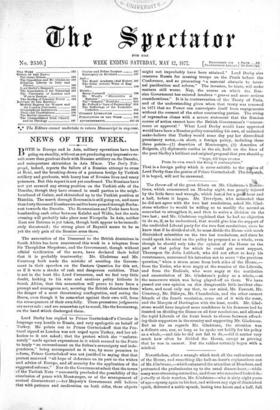Lord Derby has replied to Prince Gortschakoff's Circular in language
very hostile to Russia, and very apologetic on behalf of Turkey. He points out to Prince Gortschakoff that the Pro- tocol signed at London was not urged upon Turkey, and her ad- hesion to it not asked ; that the protest which she " unfortu- nately " made against expressions in it which seemed to the Porte to imply " an encroachment on the Sultan's sovereignty and inde- pendence," being accompanied as it was, by more promises to reform, Prince Gortscbakoff was not justified in saying that that protest removed "all hope of deference on its part to the wishes and advice of Europe, and all security for the application of the suggested reforms." - Nor do the Government admit that the terms of the Turkish Note " necessarily precluded the possibility of the conclusion of peace with Montenegro, or of the arrangement of mutual disarroament ;—her Majesty's Government still believe that with patience and moderation on both sides, these objects
might not improbably have been attained." Lord Derby also censures Russia for massing troops on the Pruth before the Conference, and so presenting "a material obstacle to inter- nal pacification and reform." The invasion, he hints, will make matters still worse. Nay, the course on which the Rus- sian Government has entered involves " graver and more serious considerations." It is in contravention of the Treaty of Paris, and of the understanding given when that treaty was renewed in 1871 that no Power can emancipate itself from engagements without the consent of the other contracting parties. The string of reproaches closes with a severe statement that the Russian course of action cannot have the British Government's " concur- rence or approval." What Lord Derby would have approved would have been a Russian policy resembling his own, of unlimited make-believe that Turkey would some day pay her discredited promissory notes, in short, a foreign policy, including these three points—(1) desertion of Montenegro, (2) desertion of Bulgaria, (3) diplomatic castles in the air, built on the lines of the poet Shelley's brilliant and original proposal that you should-r- " hope, till hope creates From its own wreck the thing it contemplates."
That is a foreign policy which is more suitable to the mins of Lord Derby than the genius of Prince Gortschakoff. The delpatch, it is hoped, will not be answered.


































